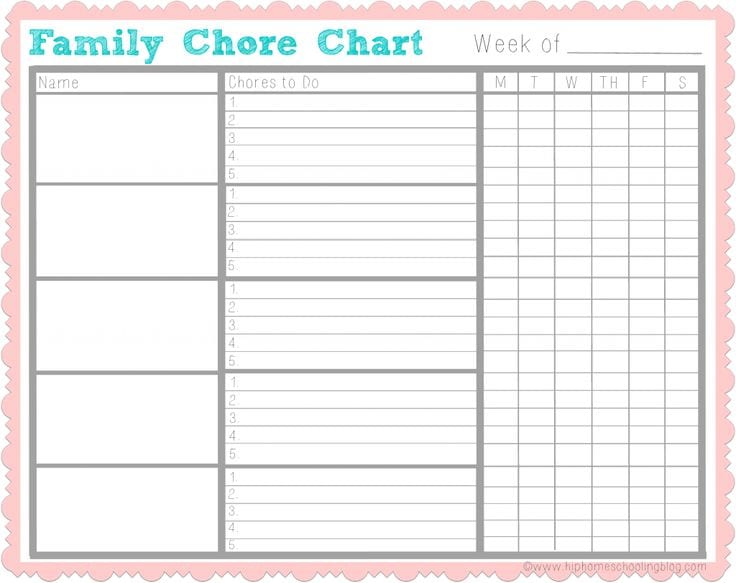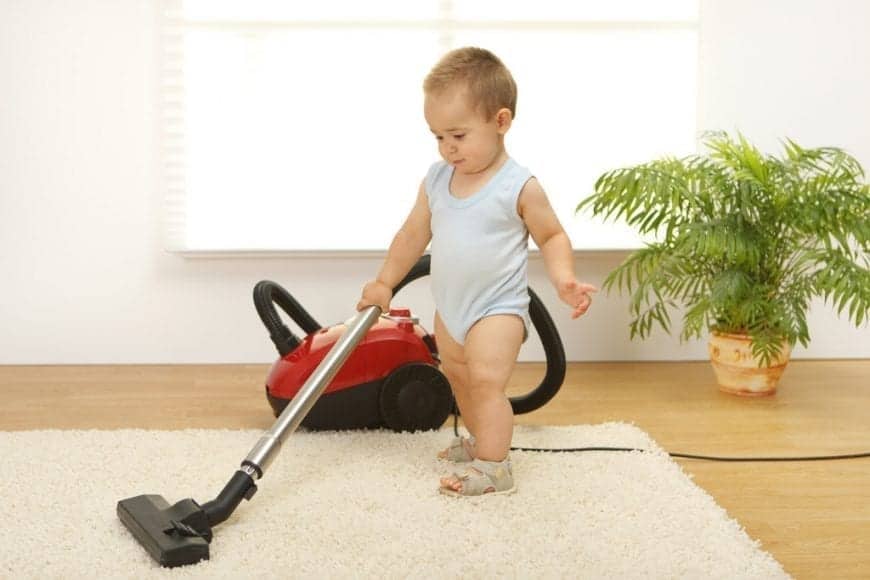Family life comes with a never-ending set of chores. In fact, when you become a parent, you discover chores you never previously knew existed such as washing off all of the baths toys after bathtime and unblocking the toilet after items have been flushed by budding scientists. The “Chore Situation” can become more complicated when parents work outside of the home, kids take up outside hobbies or extended family come to live with you.
The only way to stay halfway on top of things and maintain your sanity is to share the burden. You are a parent, but that doesn’t mean you are also a servant to everyone under your roof. Everyone in the home should be contributing what they can to the smooth running of the family, and this is how you can start ensuring this is happening.
The Chores List Or Chart


If your family is a small one and everybody has chores they take on permanently you probably do not need a chart to keep track of things. However, once your family grows, has a more complex daily routine, and creates more chaos, you might benefit from a chart to remind everybody of their responsibilities, rotate the jobs and ensure things have been done.
There are countless chore charts available out there on the internet so I won’t recreate the wheel here but I will discuss the different kinds of charts.
- Individual – If you use these, you will need a chart for each person. You usually write the chores down one side of the chart and have tick boxes for each day of the week to keep track of what has been done.
- Family – A more extensive chart is broken down into family members with their jobs written next to their name and boxes to indicate “done.”
- Chore- These charts list all of the chores that need to be done and have a box under each day so you can allocate the job to a different family member each day.
Some people choose to have two charts so they can merely swap between “week one” and “week two” and ensure all of the chores get rotated regularly. Others have additional “weekly jobs” or “monthly jobs” charts. If all of this seems like a lot of work to start with, an hour or so planning today will save you untold hours in the weeks and months to come.
Daily Chores

Making the beds. This is a daily and must-do activity for every member of the household. Nothing makes a bedroom look tidier quickly than making the bed. Except maybe a flamethrower, but you get into quite a lot of trouble going the “I’ll burn the place down, so I don’t have to clean it” route.
Washing the dishes. Either washing by hand or stacking and emptying the dishwasher. Little ones can help with this one very easily, as long as they are safe.
Taking out the trash. Family members can take turns if that makes the chore easier to handle. To avoid arguments specify if this involves just the trash from the kitchen or whether you have to go around the house emptying any other trash.
Checking the mail. A family can either pick one member to do this task exclusively or take turns doing it.
Cleaning in the kitchen. Countertops and sinks should be washed down every day, along with the cooker.
Cleaning bathroom sinks and counters. Especially important when you have teenagers who manage to create strange smells, stains, and debris all across the bathroom. We started out rotating this job until everyone complained about cleaning each others mess. Now our rule is clean up when you’ve finished.
Dusting and Vacuuming. We’re not talking corner to corner throughout the house here, and if everyone is out of the home for most of the day, you can probably bump this one down to weekly. If you do have people home during the day a quick push round with the vacuum after dinner keeps things under control.
Weekly Chores

Changing The Beds. You can either have each person strip their own bed or have one person go around and strip them all.
Cleaning bathrooms. In addition to daily cleaning. This includes cleaning the bathtub, the toilet area, the bathroom mirror, cabinets, and the bathroom floor.
Cleaning the kitchen. Countertops and sinks should be wiped down or washed daily but once a week is enough to wash down cupboard doors etc.
Mopping and sweeping the floors This can be done weekly, but if you live in an extra dusty region, or you have a family that is in and out with dirty footwear a lot, you may want to do this every other day.
Monthly Chores

Cleaning the oven. If you are at home a lot, an enthusiastic baker or someone like me who just manages to get food everywhere without even trying then you might want to do this more frequently but if you are a clean cooker then once a month is good for cleaning the oven.
Cleaning the fridge and freezer. You should clear out any food as soon as it goes past the use by date and clean any spills as soon as they happen. Once a month you should empty out the entire fridge and freezer and give all of the surfaces a good clean and sanitize.
Windows. Doing this once a month might seem like overkill but by washing the windows, doors, patio doors, etc., once a month the job will be easier than if you leave it.
Deep clean the beds. Turn the mattresses and vacuum them once a month as well as washing comforters and mattress toppers, and pillows.
Clean the furniture. Wash down any leather furniture and vacuum and fabric sofas, and chairs, etc.
Seasonal Chores

Carpets and rugs. Maybe once or twice a year you can hire a carpet cleaner, and everyone can help clean the carpets. Don’t forget to move rugs and furniture to get the entire room clean.
Closets and drawers. Not only can you clear out any old or unused clothes you can also vacuum and wash down the cupboards and drawers.
Vacuuming and cleaning vents. This is a good job to carry out when you change the filter on your boiler.
Bookshelves. It is easy to forget things like shelves that are full of books, CDs etc. Once or twice a year it is good to clean off everything from the shelves, wash them, wipe down everything that lives on the shelves and replace.







You are fabulous!!! Thanks for this – fantastic! x